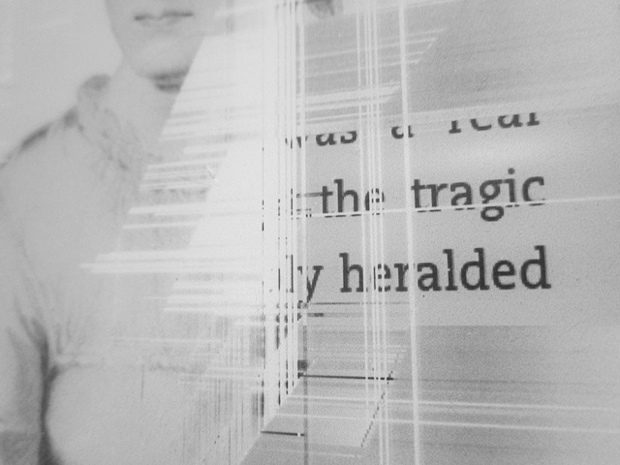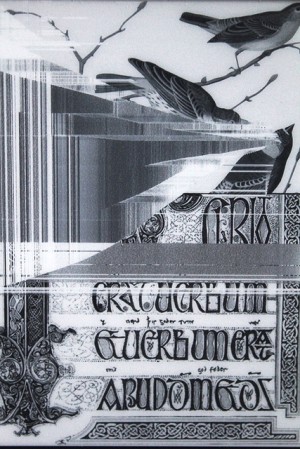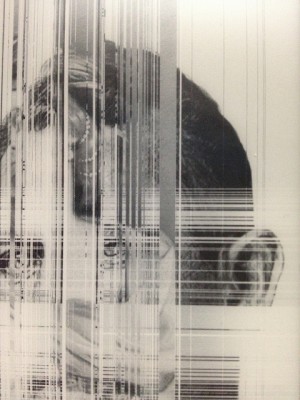You have no items in your cart. Want to get some nice things?
Go shopping
My flatmate lays it out on the kitchen table. He turns phantom pages with a flick of the wrist. The text is translucent. It swoops and scrolls, fits to size. Everybody purrs in approval. And I, the aspiring writer, I stare down at this next generation ebook with a sickly smile, and I think: sorry. I don’t get it. I don’t understand why a book has to resemble an impressive special effect…
Will the paper book be the next casualty of the information revolution? The sea of Samsungs, Androids, Apples, pads, pods, netbooks and notebooks that confront me on every plane, waiting room or cafe these days would seem to suggest it. Unlike films, newspapers or music, the web’s threat to the traditional publishing industry is not from making what’s already out there available for free, but rather providing too many enjoyable alternatives to reading. A decade ago the web remained quarantined indoors, anchored to desktops by Ethernet umbilical cords, and a good novel could still help to pass the time on a heaving tube and or lonely bus. Now kids who sport web-enabled phones can never leave what Andrew Keen calls the ‘global dorm room’ – Facebook is the book they all read, the novel they’re all writing, and they rarely need to leave its realm any more.
The result of this industrial-level distraction is a gradual infantilization, not only of the way we write (if Facebook is a collective novel, it’s a poorly punctuated one), but of the way we read. In his seminal essay Is Google making us stupid? Nicholas Carr talks of how the fidgety behaviour we associate with small children is spreading up the age brackets, and how the “deep reading that used to come naturally has become a struggle.” And that was written when tablets and smartphones were still new.
Let’s be honest, serious reading is an often difficult task, requiring mental space and energy, and with more than a whiff of deferred gratification about it. It promises something richly rewarding in return for an investment of hours, days, or weeks; the internet squirts an all-singing, all-dancing boredom-prophylactic into your eyeballs after an investment of seconds. Trying to focus on a book while you’re online is a bit like studying for an exam in the midst of a multi-media carnival parade: a bitmapped swirl of trivia, live gossip, shimmering images, sputtering podcasts, YouTube echolalia, links, jinks, jokes, tweets, tropes, memes, clips, bits, bytes, sites…

Enter the e-reader. Touted as one way to save old-fashioned reading in the age of the touchscreen, the Kindles, iPads and Nooks offer a sort of détente between the slower-paced world of print and the gratifying immediacy of the web age – a high-tech life-rope to a low-tech tradition. After all, in a resource-hungry world, does the paper itself still matter if people continue to download (and even occasionally pay for) books?
But the e-reader is not a simple format switch, the same thing on a different device. The reality is considerably more complicated. Not only have ereaders created an ebook market that’s becoming increasingly independent of the traditional one (and one which predictably involves scores of authors giving away their work for almost nothing), but their loyalties are to the future – or to put it another way, they’re subject to the same market dynamic as every other bit of hardware out there: planned obsolescence, accompanied by regular competitive upgrades.
Here the essential fallacy in the e-reader as saviour of the publishing industry argument becomes apparent. There’s only so far you can upgrade a screen which displays books; once you’ve been through a couple of generations (the Kindle is now on its fifth) new improvements can only go one way – more speed, more multimedia, more interactivity. The Kindle Fire, Amazon’s recent showpiece, boasts ‘over 22 million movies, TV shows, songs, books, and magazines, plus tens of thousands of popular apps and games such as Angry Birds Space, Skyscanner, Jamie’s 20 Minute Meals and Auto Trader.’ And… books? Yes, those too.
Admittedly the Fire is an offshoot branch of the family, but it does suggest that the ereaders of the future are about much more than just reading. By setting the simple book within the visceral riot of the contemporary web, the Kindle and its futuristic brethren risk eclipsing it entirely. Let’s not even dwell on the fact that it’s produced by a company famous for slashing publisher revenues since the Millennium. If a machine boasting of its power to bring a whirlwind of music, video and games into your hands is publishing’s last best hope, then things are grim indeed.
Perhaps it’s symptomatic of the times we live in. Our age is witnessing a grand project of de-contextualisation, as old media is re-framed within a new, multi-tasking environment. The recent Storyville documentary about Google Books’ attempt at a forced-collectivisation-of-literature program, by means of a Soviet-scale push to digitise the bulk of the world’s libraries without asking anyone, highlighted the culture clash between a millennia-old literary tradition and a new information economy based on speed, ease and instant appropriation. What first appears a noble sentiment – who can argue against saving the out-of-print archives from decay? – is revealed as a potentially reductive and profit-oriented credo.
Leaving copyright issues aside, books are not books as we know them to Google. They’re the information economy’s equivalent of undiscovered oil, more fuel for the search engine, and the project’s resounding achievement was to turn years of scholarly effort into a highlighted citation. Narrative, cohesion, authorial intention: all irrelevant. A book is just a bit of long-form content. Of course it might steer some to buying a copy – links to Amazon in the sidebar and so on – but we’d be optimistic indeed to assume all those all students compiling their bibliographies from a laptop are eager to pay if only someone would just let them.

Unusually in that case, Google lost the battle; their books-into-blurb program won few supporters among ranks of authors, editors and publishers less than overjoyed to see years of their labour reduced to a splash of searchable text, and the overlords of the information age were forced by court injunction to put the brakes on their voracious digitising. But the case speaks volumes – every pun intended – about Silicon Valley’s attitude to the oldest text-based technology of all. Culture is content, and the quicker, easier and cheaper it flows, the better for everybody. Why read when you can just scan? Why attempt to understand the subtleties of an author’s argument when the web will give you two lines you can patch into your thesis? If it turns coherent works into orphaned snippets, it turns serious readers into distracted surfers. After all, let’s not forget that Google is a company whose revenue stream comes from servicing humanity’s global attention deficit, a business model based on directing us toward content calculated to tantalise – a compelling thought when we remember these are the people we’re about to entrust the bulk of world literature to. We’re handing the library keys to a company that turns interruption into algorithmic science.
But perhaps we shouldn’t let ourselves lapse into wild dystopia. The digitization of books, the evolution of ereaders into tablets and web portals – all just aspects of a slow process that may well transform the publishing industry, but will never quite kill it off entirely. The reality is that whichever format they come in, books are too central to our culture to be totally side-lined by the web’s glitzy ephemera. The Booker, Pulitzer or Costa remain major press events; today’s bookslams, signings, festivals and other live literary events are doing more than ever to yank the author out of seclusion, and reveal a passion for writing that goes far beyond the polite or academic. Even the young who we imagine don’t read any more still surprise us: the fans of Dumbledore, Discworld or The Hunger Games are prepared to besiege Waterstones or Barnes & Noble for a major signing. It’s hard to imagine them getting so worked up about a blog-post.
In a perfect world, book selling might continue to thrive while the web makes it possible to gather together the ‘”ong tail” niches of out-of-print or obscure volumes – albeit with a touch more respect for the original than Google has shown. The web is best when it shines a torchlight on overlooked corners, giving unread authors the chance to circumvent the slush pile and gain a readership, while allowing ereaders to bring books to new audiences, the young and disabled among them. The reading community finds new ways to unite online even if what it reads becomes more piecemeal and disparate. And in doing so it’s simply part of the great contradiction of our time: that we gather ever more closely around ever more scattered campfires. The community of readers now spans the planet. If it could only find the time to read.
Of course reality is more prosaic, and the digital revolution – like the industrial one before it – will have its casualties whether we like it or not. But we do have to set our own concerns within a wider historical picture and remember that change is always terrifying to those who can only imagine its consequences. One noted thinker I glanced at recently complained of how information technology actually reduces our faculty for recall by providing an artificial prop to our memories – an observation that sounds like something Nicholas Carr might make to bait a Wired readership. In this case however the writer was Plato, and the new technology he feared was writing itself. Perhaps progress, like a novel reframed within the borders of a Kindle Fire, is all just a matter of context.

About Dale Lately
Dale has run successful literary events both north and south, including a London-based storytelling night called Confessions that was featured in the Times. He also regularly performs at readings and literary events, and contributes to several literary platforms. He has recently finished a writing tour of Coalition Britain he calls "Orwell via Charlie Brooker" and blogs about postmodern culture, the web, and "Shop and Awe"—or the politics of contemporary consumerism.




